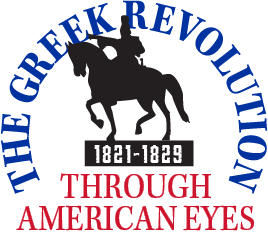I. Aspects of American Philhellenism:
Edward Everett, Thomas Jefferson and Adamantios Korais; Albert Gallatin and The Marquis de Lafayette
C4. The Last Communication from Korais to Jefferson
(Stratakis, pp. 163–64.) January 30, 1825
Sir,
Please give me the pleasure of accepting a copy of the collection of the political pamphlets of Plutarch which I have just published. As my age does not permit me any further fatiguing editions, it is necessary that I finish my career with occupations which save me at least from the boredom of complete inaction. In the Dialogue, which serves as prolegomena to these pamphlets, you will note that I have not failed to take your advice.
Permit me, Sir, on this occasion, to remind you that I have already had the honor to write you concerning your future relations with a free Greece. It is undoubtedly true that the recognition of its independence is in no way harmful to your interests; but I would like to see you act with less circumspection. The English will probably be the first to recognize what they can no longer prevent. It is to your interest, it would seem to me, to have at the Greek government certain persons who are authorized to recognize it simultaneously with the English, or at least not leave time to any other power to declare itself as the second.
These persons could furthermore, before the recognition itself, prepare the way for it by secret negotiations, at the same time as they assist by their advice in the desire which the Greek nation has to take your government as model. The closer the constitution of Greece is to yours, the more your interests will be favored therein by way of preference over those of other nations. Believe me, Sir, it is time for you seriously to consider not abandoning us to the pleasure of the English. They are already starting to honor us with titles and you know that for certain ears titles are sounds too imposing and ringing not to drown out the modest voice of the fatherland.
You have, Sir, given a terrible blow to the oligarchs of Europe by the manner in which you treat your illustrious host; it is no longer an argument, but things which you oppose to their sophism: “One must not become angry with things, because that does not affect them in any way.” This is an apothegm which is attributed to Turgot, but which Euripides stated before him. [GREEK TEXT] tois apáyuasiv ydp ouxi Ovuowodai Xpeov Mélei ydp aürois-oudév.[GREEK TEXT] Give them, I beseech you, a second blow by recognition of the independence of my country so that free Greeks can receive the compatriots of Jefferson and Franklin and treat them as brothers.
These are the wishes, sir, of your devoted servant,
A. Coray
January 30, 1825
I have no need, sir, to point out to you that this letter must be considered anonymous.
(Hatzidimitriou 36-37)
Source: Constantine G. Hatzidimitriou, Founded on Freedom and Virtue: Documents Illustrating the Impact in the United States of the Greek War of Independence, 1821-1829 (New Rochelle, New York: Aristide D. Caratzas, 2002).
